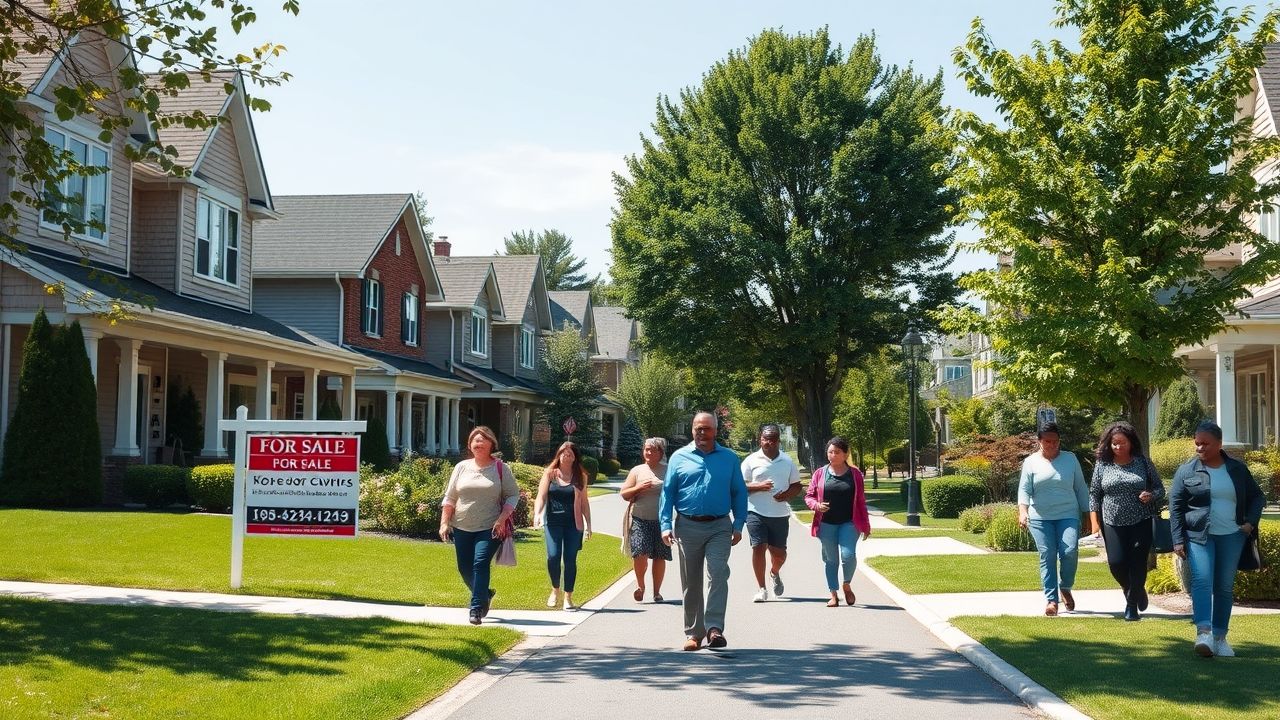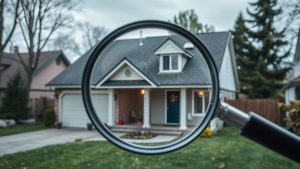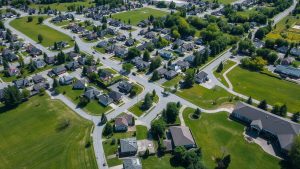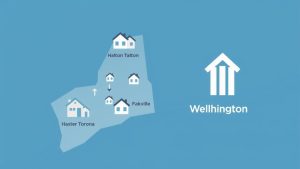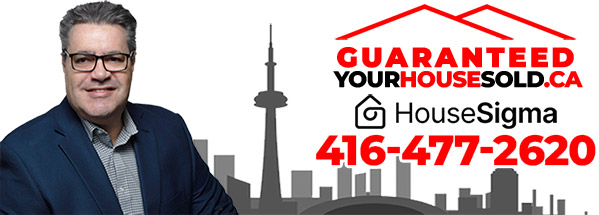Are school ratings secretly killing your home’s value in the GTA?
This guide shows you how things really work. Buying or selling a home in Georgetown, Milton, Guelph, Acton, Oakville, or Burlington is tough. This guide makes it easier. Think of it as your step-by-step plan.
Understanding the GTA Real Estate Game
The Greater Toronto Area market moves fast. What worked last year might not work now. Knowing the trends helps you make smart choices. You need to know what’s happening right now, in 2024, and what might happen in 2025.
What’s Happening Now (2024 Trends)
Across the GTA, things are shifting. After some ups and downs, the market is finding its feet. Interest rates changed how much people can borrow. This affects prices.
- Georgetown & Acton: These areas offer a small-town feel but are close to the city. Prices here often follow Halton Hills trends. Buyers look for value and space. Sellers need good pricing to attract buyers moving from more expensive areas.
- Milton: Milton is young and growing fast. Families love it. Good schools are a big draw here. The market saw lots of new homes built. Resale homes compete with these. Prices stabilized a bit in early 2024, but demand for family homes stays strong. Look for steady growth, maybe 3-5% price increases through 2024.
- Guelph: Guelph has its own strong economy with the university and tech jobs. It’s not just a Toronto suburb. This makes its market more stable. Prices held up well compared to some other GTA spots. Green initiatives and community focus attract buyers. Expect continued buyer interest, especially for homes near the university or green spaces.
- Oakville & Burlington: These areas are known for being upscale. They have great schools and lakefront access. Prices here are higher. The market slowed down with higher interest rates, but luxury homes still sell. Buyers are picky. Sellers need perfect presentation and smart pricing. Some reports suggest a slight dip in sales volume early in 2024 compared to peak years, but prices remain relatively high.
Expert Insight:
“Buyers in 2024 are cautious but informed,” says David Lee, a real estate agent specializing in Halton Region. “They know interest rates are higher. They want value. Homes priced right and showing well are still selling, often quickly. Overpriced homes sit.”
Looking Ahead (Possible 2025 Outlook)
Predicting the future is hard. But we can look at signs.
- Interest Rates: If rates stay high, the market might stay balanced. Buyers and sellers have more equal power. If rates drop, more buyers might jump in. This could push prices up again.
- Inventory: How many homes are for sale matters. If lots of homes come up for sale (high inventory), buyers have choices. Prices might soften. If few homes are listed (low inventory), buyers compete. Prices might rise.
- Immigration: Canada welcomes many newcomers. Lots settle in the GTA. This adds demand for housing. It usually helps keep prices strong over time.
- Local Factors: Things like new big employers, transit projects (like GO train improvements), or new community centers can boost specific areas like Milton or Guelph.
Keep watching the news. Check local real estate board reports, like the Toronto Regional Real Estate Board (TRREB). They give monthly updates.
The School Rating Question: Does it Really Matter?
Okay, let’s talk schools. Parents always ask: do good schools mean higher home prices? It seems simple. Good schools attract families. More families wanting to live there push prices up. Right?
It’s not always that simple.
Good vs Bad Schools Home Value: The Connection
Yes, there is a link. Areas with top-rated schools often have higher home prices. Think Oakville or parts of North Toronto. People pay extra to get their kids into those schools.
Research often shows homes in top school zones sell faster. They also hold value better, even when the market slows down.
But here’s the catch. Are the schools making the area expensive? Or are expensive areas just where families who value education choose to live? These families often have higher incomes. Higher incomes mean kids might have more resources (tutoring, books, travel). This can help test scores.
It’s a bit of a circle.
How School Quality Affects Prices
Think about it this way: a good school rating acts like a big, shiny feature for a neighbourhood. Like a park or good transit.
- High Demand: Top schools create steady demand from families. Even if someone doesn’t have kids, they know a good school helps resale value later.
- Price Premium: Buyers might pay 5%, 10%, or even more for a similar house in a better school zone.
- Stability: Neighbourhoods known for good schools often feel more stable and family-friendly. This adds to their appeal.
What About Bad Schools Decrease Property Value?
If good schools boost value, do poor schools hurt it? Yes, they can.
A poorly rated school can make families hesitate. If a school has a bad reputation or very low scores, it can be a negative for the area.
However, ‘bad’ is relative. A school ranked lower in Oakville might still be great compared to the provincial average. You need to look at the specific school and the whole neighbourhood picture.
Sometimes, areas with lower-ranked schools are more affordable. This attracts different buyers, like first-time buyers or investors. The price might already reflect the school situation.
Comparing School Zones and Property Value
When you compare areas like Milton and Guelph:
- Milton: Has many newer schools. Ratings can vary. Families moving here actively check Fraser Institute rankings or EQAO scores. A home just inside a top school boundary can cost more than one just outside.
- Guelph: Has a mix of older and newer schools. Some areas have very established, well-regarded schools. Other areas might be improving. Buyers look at specific school performance relative to the neighbourhood’s price point.
Key Takeaway: Don’t just look at the rank number. Visit the school if you can. Talk to people in the neighbourhood. Look at school websites. Check EQAO results directly ([link to EQAO website could go here]). Understand the school’s programs, not just test scores.
Getting Your Money Right: Financing Your GTA Home
Buying a home costs money. Likely, a lot of money. You need a plan.
Figure Out What You Can Afford
Don’t just guess. Talk to a mortgage broker or your bank. Get pre-approved.
A pre-approval tells you:
- How much a lender might lend you.
- What your interest rate might be.
- What your monthly payments might look like.
This is not a final approval. But it shows sellers you are serious. It also sets your budget.
Remember costs beyond the mortgage:
- Down Payment: Usually 5% to 20% (or more) of the home price.
- Land Transfer Tax: Ontario has one, and Toronto has its own too (if buying in the city). Buyers in places like Burlington or Guelph only pay the provincial tax. Use an online calculator ([link to Ontario LTT calculator]). First-time buyers might get rebates.
- Legal Fees: A lawyer handles the closing. Costs vary.
- Home Inspection: Strongly recommended. Costs a few hundred dollars.
- Closing Costs: Title insurance, adjustments for property taxes/utilities paid by the seller.
- Moving Costs: Truck rental, movers.
Budget for about 1.5% to 4% of the home price for closing costs, on top of your down payment.
First-Time Home Buyer Programs Ontario
If this is your first home, look for help:
- Land Transfer Tax Rebates: Ontario offers a rebate up to $4,000. Toronto offers its own rebate too.
- Home Buyers’ Plan (HBP): Lets you borrow from your RRSPs (tax-free) for a down payment. You have to pay it back over time. ([link to HBP details on Canada.ca]).
- First Home Savings Account (FHSA): A newer account. Combines features of an RRSP and TFSA. Contributions are tax-deductible. Withdrawals to buy a first home are tax-free.
- Shared Equity Mortgages: Some programs might offer help with your down payment in exchange for a share of the home’s future value increase. The government’s program ended, but some private options exist.
Talk to your mortgage specialist about these programs. Rules can change.
Expert Insight:
“Getting pre-approved early is critical,” advises Maria Fernandez, a mortgage specialist in Guelph. “It prevents disappointment later. It also locks in an interest rate for a period, protecting you if rates go up while you’re house hunting.”

Finding Your GTA Home: The Search
Okay, you have your budget. You know the areas (Georgetown, Milton, Guelph, etc.). Now, find the house.
Working With a Real Estate Agent
You can search alone. But a good local agent helps a lot.
They:
- Know the neighbourhoods inside out.
- Have access to listings sometimes before they hit public websites.
- Understand local market values.
- Guide you through paperwork.
- Negotiate for you.
Choose an agent who works in the specific area you like. An Oakville expert might not know Guelph as well. Interview a few agents. Ask about their experience in your target town.
Where to Look
Your agent sets up searches based on your needs (price, size, location).
Also look yourself:
- Realtor.ca: The main public site for listings.
- Local Brokerage Sites: Sometimes have more details or early info.
- Drive Around: Get a feel for neighbourhoods. See ‘For Sale’ signs.
- Open Houses: A good way to see inside homes without commitment.
What to Look For (Beyond Curb Appeal)
Think long-term. A pretty kitchen is nice. But check:
- Layout: Does it work for your life?
- Condition: Roof age? Furnace? Windows? Big repairs cost money.
- Location: Noise? Traffic? Proximity to schools, parks, transit, work?
- Lot: Size? Usable space? Drainage?
- Future Potential: Can you renovate or add value later?
- Neighbourhood Vibe: Talk to neighbours if you can.
GTA Specific Tip: Check flood maps, especially if buying near creeks or rivers (common in areas like Guelph or parts of Milton). Check proximity to major highways (401, QEW) for noise and commute times.
Making an Offer and Closing the Deal (Buying)
You found the one! Now, make an offer.
The Offer Process
Your agent prepares the Agreement of Purchase and Sale. Key parts:
- Price: What you offer to pay.
- Deposit: Shows you’re serious (usually 5% of price, held in trust).
- Conditions: Things that must happen for the deal to be firm. Common ones:
- Financing: You need final mortgage approval.
- Home Inspection: A professional checks the house. You can back out if big issues are found.
- Status Certificate Review: (For condos) Lawyer checks the condo corp’s health.
- Closing Date: The day you officially get ownership (and the keys!).
Negotiation
The seller can accept, reject, or counter your offer.
- Accept: Great! Move to fulfill conditions.
- Reject: You might offer again or walk away.
- Counter: They change something (like price or closing date). You can accept their counter, counter back, or walk away.
This back-and-forth is where your agent‘s skill helps.
Multiple Offers (Bidding Wars)
In hot markets or for popular homes, you might compete with other buyers.
- Strategy: Offer your best price. You might have only one chance.
- Conditions: Sometimes buyers remove conditions (like inspection) to make their offer stronger. This is risky. Understand the risks before doing it.
- Blind Bidding: In Ontario, you usually don’t know what others offered. This can be stressful.
After the Offer is Accepted
- Fulfill Conditions: Get final mortgage approval. Do the home inspection. Your lawyer reviews documents.
- Waive Conditions: Once satisfied, you sign waivers. The deal is now firm.
- Prepare for Closing: Arrange insurance. Meet with your lawyer to sign final papers. Transfer down payment and closing funds to your lawyer.
- Closing Day: Lawyer handles money transfer. Seller gets paid. You get the keys!
Selling Your House Fast in the GTA
Selling needs a plan too. You want the best price, quickly.
Preparing Your Home (Staging)
First impressions matter. A lot.
- Declutter: Remove personal items, extra furniture. Make rooms look bigger.
- Deep Clean: Floors, windows, bathrooms, kitchen. Make it sparkle.
- Repairs: Fix leaky faucets, broken tiles, cracked drywall. Small fixes make a big difference.
- Paint: Neutral colors appeal to more buyers.
- Curb Appeal: Tidy lawn, clean porch, welcoming entrance.
Professional staging can help. They make your home look its best for photos and showings.
Pricing it Right
This is crucial. Overprice, and buyers stay away. Underprice, and you lose money.
Your agent does a Comparative Market Analysis (CMA).
- Compares your home to similar homes recently sold nearby.
- Looks at current listings (your competition).
- Considers market trends.
Listen to your agent‘s pricing advice. They know the local market in Burlington, Acton, or wherever you are.
Marketing Your Home
Your agent handles this, but know what’s involved:
- Photos/Video: High-quality visuals are essential.
- Online Listings: MLS (Realtor.ca), brokerage sites, social media.
- Showings: Be flexible. Keep the house tidy.
- Open Houses: Can attract serious buyers and neighbours.
Handling Offers (Selling)
You might get one offer, or several.
- Review Offers: Look at price, deposit, conditions, closing date.
- Negotiate: Your agent helps you respond (accept, reject, counter).
- Multiple Offers: Your agent helps manage the process. Decide on a strategy (e.g., set a deadline for offers).
After Accepting an Offer
- Buyer Fulfills Conditions: Wait for them to get financing, inspection done.
- Deal Becomes Firm: Once conditions are waived.
- Prepare for Closing: Hire a lawyer. Start packing! Coordinate move-out.
- Closing Day: Your lawyer receives funds, pays off your mortgage/liens. You sign papers. Give keys to the lawyer. New owner takes possession.
Selling Tip for Milton/Georgetown: Highlight family features – nearby parks, schools, community centers. Buyers here prioritize these.
Selling Tip for Oakville/Burlington: Emphasize quality finishes, lifestyle features (lake access, trails), and school reputation.
Selling Tip for Guelph: Focus on unique character, energy efficiency (if applicable), community involvement, proximity to university/jobs.
Legal Stuff: Don’t Ignore It
Real estate deals are legal contracts. You need a lawyer.
Role of Your Lawyer
- Buyer: Reviews offer, searches title (checks ownership history, liens), arranges title insurance, prepares closing documents, handles money transfer.
- Seller: Reviews offer, prepares transfer documents, pays off mortgage/liens, confirms funds received.
Choose a lawyer experienced in real estate.
Key Legal Documents
- Agreement of Purchase and Sale: The main contract.
- Title Search: Confirms seller owns the property clear of issues.
- Title Insurance: Protects you against future title problems.
- Mortgage Documents: Your loan agreement.
- Deed/Transfer: Officially transfers ownership.
Understanding Land Transfer Tax (LTT)
Buyers pay this tax when they buy property in Ontario.
- Provincial LTT: Applies everywhere (Georgetown, Milton, Guelph, Acton, Oakville, Burlington). It’s a percentage based on the price.
- Municipal LTT: Only applies if buying in the City of Toronto. If you buy outside Toronto, you only pay the provincial tax.
Calculate it beforehand so you’re not surprised. Ask your lawyer or use an online calculator.
Remember potential first-time buyer rebates!

Moving In/Out: The Final Step
Closing day isn’t the end. You still have to move.
Planning Your Move
- Book Movers Early: Especially during busy seasons (summer).
- Change Address: Post office, bank, driver’s license, health card, subscriptions.
- Utilities: Arrange disconnection at old place, connection at new place (hydro, gas, water, internet).
- Packing: Start early. Label boxes clearly by room.
- Insurance: Ensure you have home insurance starting on closing day.
Moving Day Tips
- Pack an ‘essentials’ box: Toiletries, medications, basic tools, snacks, important papers. Keep it with you.
- Protect floors and walls during the move.
- Do a final walkthrough of your old home to ensure nothing is left.
- Get keys for your new home from your lawyer (usually late afternoon on closing day).
- Do a quick check of the new home upon arrival. Make sure agreed-upon items are there, and nothing is damaged.
Moving is stressful. Planning makes it smoother.
High Rated Schools and Real Estate: The Long View
Let’s circle back to schools and value.
Buying in a top school district in Oakville might cost more now. But history suggests these areas often appreciate well. They hold value because demand from families stays constant.
Buying in an up-and-coming area of Milton or Guelph with improving schools could be a smart investment. You might get in at a lower price. If the school and neighbourhood improve, your home value could grow faster than average.
Poor school district house price concerns are valid. But look deeper.
- Is the district improving? Are there plans for new schools or programs?
- What else does the neighbourhood offer? Parks, transit, community feel?
- Is the price low enough to offset the school concerns?
Sometimes, a ‘poor’ score doesn’t tell the whole story. A school might have great teachers or special programs not reflected in province-wide tests.
Ultimately, the link between school ratings home prices is real. It’s one factor among many. Consider your family’s needs now and your investment goals for the future.
FAQ: Your GTA Real Estate Questions Answered
Q: How much down payment do I REALLY need in the GTA?
A: Minimum is 5% for homes under $500k. For $500k-$1M, it’s 5% on the first $500k and 10% on the portion above. For $1M+, you need 20%. But a larger down payment means a smaller mortgage and potentially avoiding CMHC insurance (required if under 20% down).
Q: Should I buy first or sell first?
A: Depends on the market and your finances. In a seller’s market (lots of buyers, few homes), selling first might feel safer – you know how much money you’ll have. In a buyer’s market (more homes, fewer buyers), buying first (with a financing condition) might let you find your dream home without pressure. Talk to your agent and mortgage broker.
Q: What’s the difference between freehold and condo townhouse?
A: Freehold: You own the house and the land. No condo fees. You handle all exterior maintenance (roof, lawn, windows).
Condo Townhouse: You own the inside of your unit. The land and exterior are common elements managed by a condo corporation. You pay monthly condo fees for maintenance, insurance, etc. ([Internal link idea: could link to a blog post specifically about Freehold vs Condo Townhouse]).
Q: Are bidding wars common in Georgetown or Acton?
A: Less common than in Oakville or central Toronto, but they happen for desirable homes, especially if priced attractively. Being prepared with pre-approval is key.
Q: How important is a home inspection?
A: Very important. It identifies potential costly issues (foundation, roof, electrical, plumbing) before you buy. Skipping it to win a bidding war is risky. You might face expensive surprises later.
Q: Do I pay commission when buying a home?
A: Usually, the seller pays the commission, which is split between the seller’s agent and the buyer’s agent. This can be negotiated, but typically buyers don’t pay agent commissions directly.
Q: How are property taxes calculated in Guelph vs Milton?
A: Each municipality sets its own tax rate based on its budget needs. This rate is multiplied by your home’s assessed value (done by MPAC – Municipal Property Assessment Corporation). Rates vary year to year and city to city. Check the specific municipality’s website for current rates.
Navigating the GTA real estate market takes work. Know the trends in areas like Georgetown, Milton, Guelph, Acton, Oakville, and Burlington. Understand financing. Decide what matters most to you – including school quality. Work with good professionals (agent, broker, lawyer).
This guide gives you a strong start. Now, take the next step. Do your research for the specific town you love. Ask questions. Make informed decisions. Your perfect GTA home, or a successful sale, is out there.
(External Link Idea: Include a link to the Real Estate Council of Ontario – RECO – website for consumer protection information: www.reco.on.ca)
Ready to make your move? Share your thoughts or questions below. Or reach out if you need expert help tailored to your specific situation in the GTA West market.

